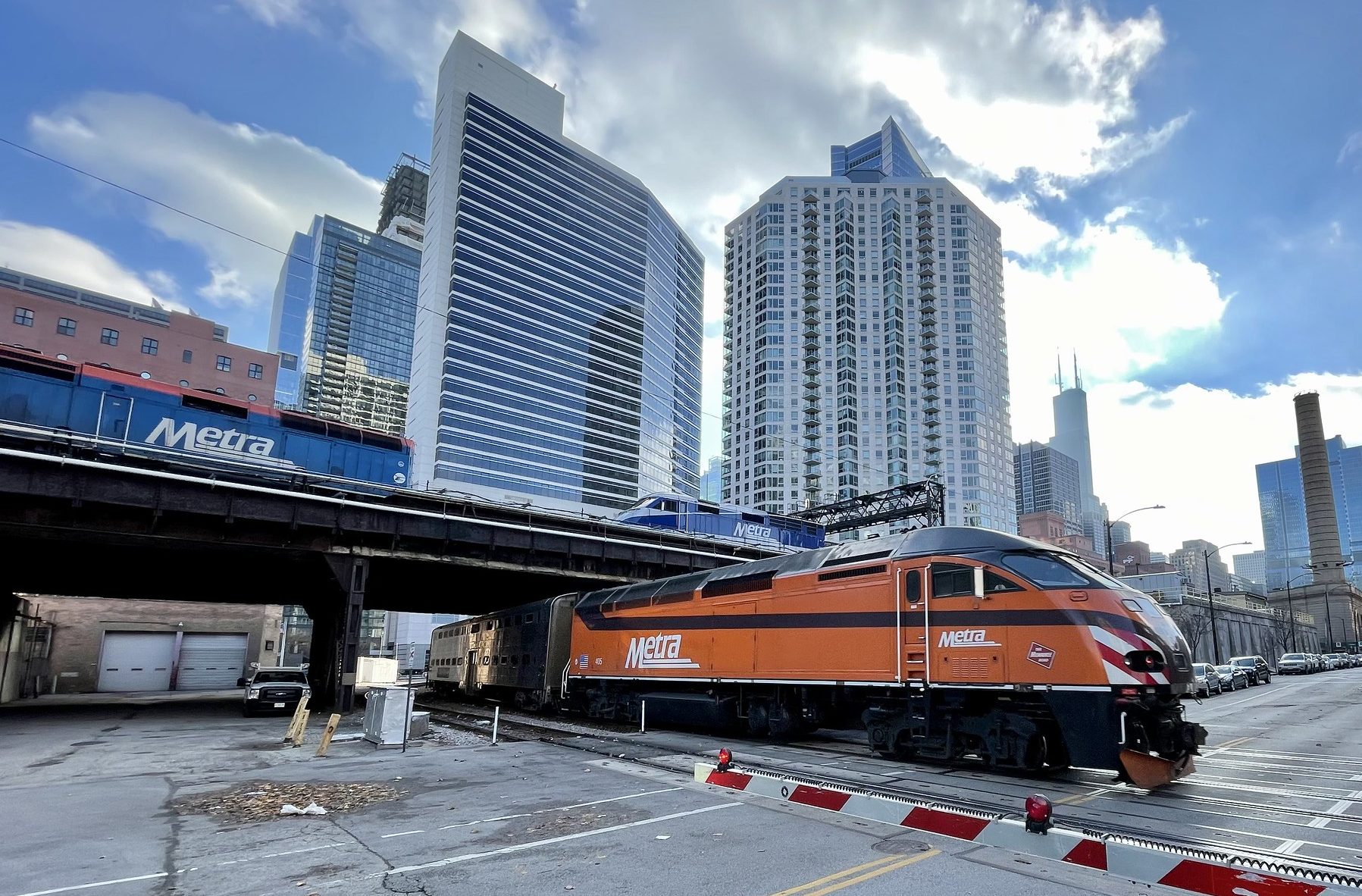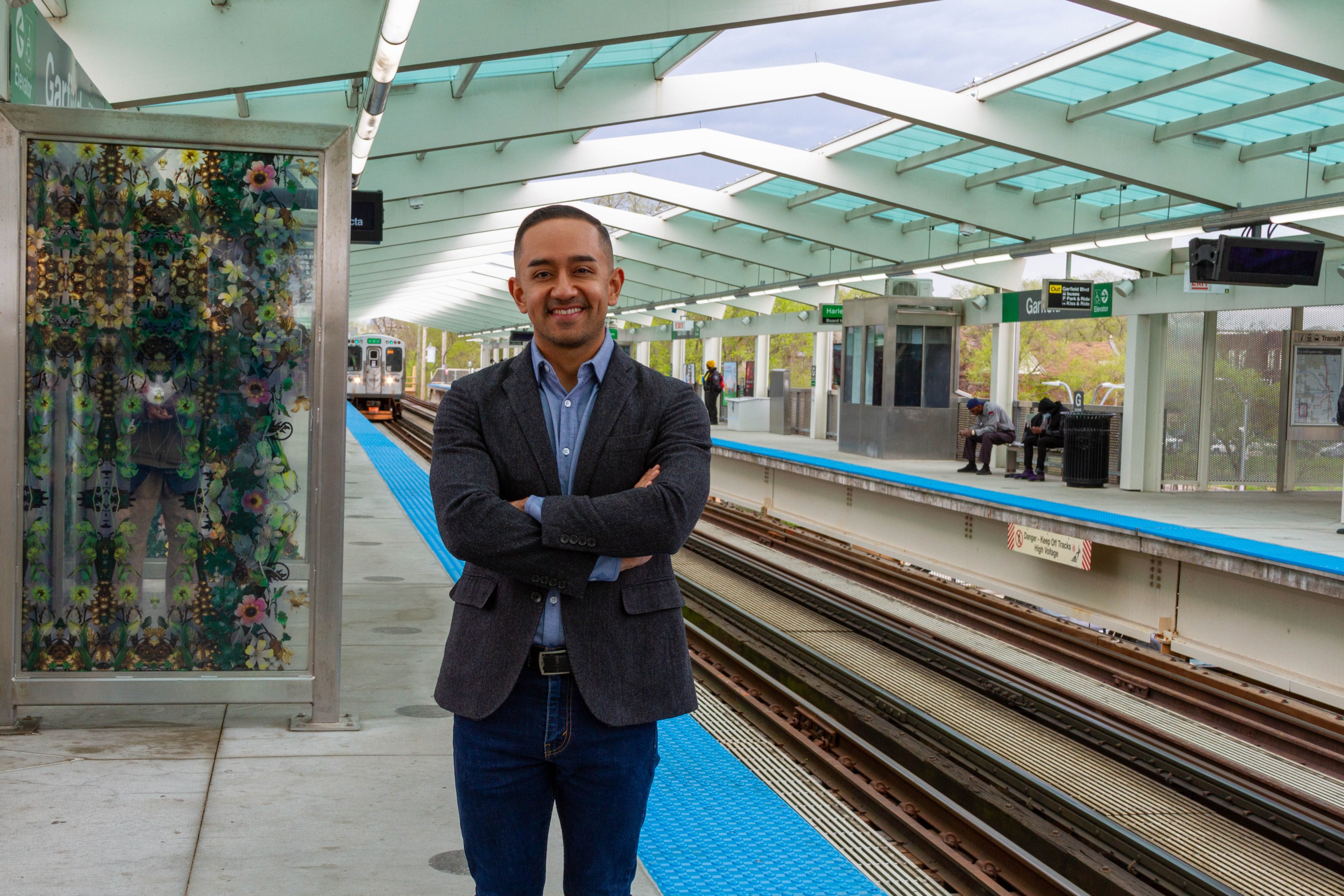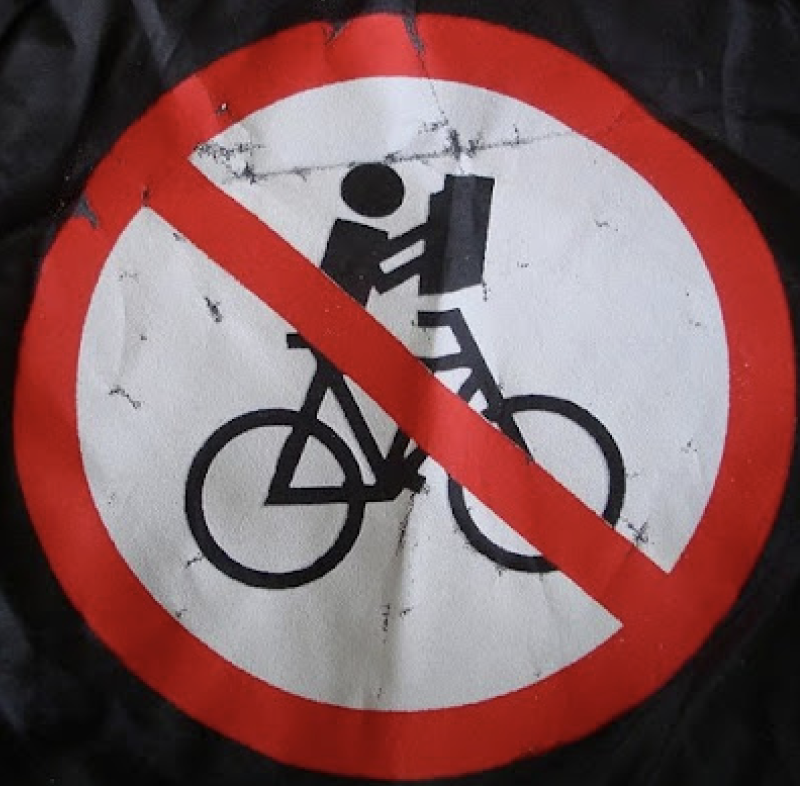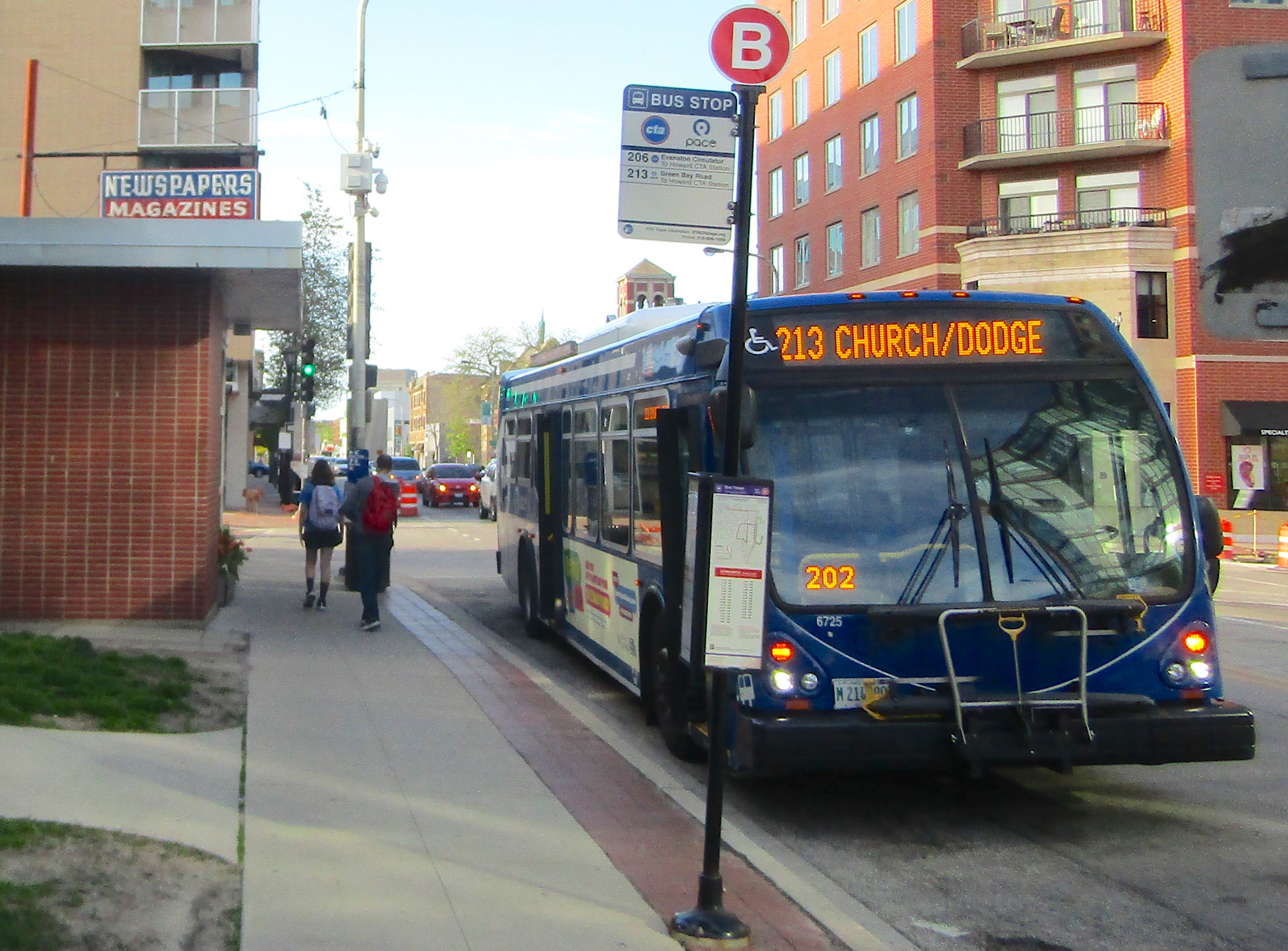Metra board members object to budget proposal to end Super Saver Monthly Pass
10:15 AM CDT on October 14, 2022

A Metra train crosses Clinton Street in Chicago. Photo: Steven Vance
Metra’s proposal to discontinue systemwide day passes, three-zone day passes, and a $100 systemwide Super Saver Monthly Pass in favor of zone-based single-day and monthly passes faced such as strong backslash during the October 12 meeting of the Metra Board of Directors that the press release announcing the proposed new budget framed it as just one of many possibilities.
At $100 currently, the Super-Saver Monthly is cheaper than most regular, fare zone based monthly passes. The only exceptions are the sections of Metra Electric and Rock Island District lines that fall within Chicago city limits – under the Fair Transit South Cook pilot, all riders on those lines pay reduced fares. The proposed Metra 2023 budget would cut the cost of the regular monthly passes to the equivalent of 16 one-day tickets – which would be less than $100 on MED and RID lines, but would only be less than $100 up to fare zone D on all the other lines, making it a more expensive option in all but a handful of suburbs.
Metra also proposes eliminating a popular $10 systemwide day pass and a $6 day pass that’s good for three specific fare zones, in favor of what’s basically a revived version of the former Round Trip Plus pass, which would cost the equivalent of two one-way tickets and the ticket holder would be locked to specific fare zones. Metra introduced the systemwide day pass and the Round Trip Plus pass during the summer of 2020, but the former proved to be more popular than the later, which caused the Round Trip Plus pass to be discontinued.
In a smaller, but notable shift, Metra is proposing to change its incremental fare policy. Riders who, for example, have a ticket for fare zones A-D can use it to travel to fare zone E if they pay $1.00 and to fare zones F, G, etc. if they pay another 50 cents per zone. While Metra riders can currently do it with any ticket, the new fare policy would propose making it monthly pass only. This would mean that riders with a one-way A-D ticket wishing to travel to fare zone E would need to buy a $4.00 D-E one way ticket. While the incremental fares cost the riders more than buying the ticket for the fare zones they wish to travel, it is a useful feature when, for example, they already have an A-D 10-ride handy and need to go to Fare Zone G. The changes to the policy were described as a way to simplify fare collection for conductors – since, even for riders who use Ventra tickets, conductors have to issue paper tickets for incremental fares – and help push riders toward monthly passes.
During the Metra Board of Directors meeting, several board members representing the suburbs argued that shifting toward zone-specific passes was a step backward, since it would make the ticketing more complicated and fly in the face of how popular the passes, especially the Super Saver, have been. They argued that Metra would be better off shifting toward fewer fare zones and do more to develop suburb-to-suburb travel, arguing that there was untapped demand.
According to the draft budget, while monthly passes used to be Metra’s most popular ticket, its sales plummeted during the COVID-19 pandemic as it became less cost-effective for many formerly regular commuters. Many companies directed employees to work remotely and, even after some return to office, more riders are working remotely during at least some of the work days. The Super Saver monthly, which was introduced in July, led to an increase in monthly pass usage. According to the September 2022 ridership report, the percentage of riders who bought the monthlies went from 14 percent of all riders in June 2022 to 25 percent of all riders in July, 29 percent in August, and 33 percent in September. By comparison, the percentage of riders who bought one of the day passes went from 27 percent in June to 21 percent in July, but didn’t fluctuate much since then, reaching 22 percent in August and 19 percent in September.
When the $10 day pass and the Round Trip Plus were available simultaneously, the latter accounted for a significantly smaller share of ridership than the former, and it was discontinued this year in favor of a $6 three-zone day pass. At the time, Metra officials described it as a way to "incentivize short trips and attract more customers." It has been a good deal for commuters traveling to the Loop from the rest city and some nearby suburbs, as well as for suburb-to-suburb workplace commuters.
Metra is facing financial pressures as federal stimulus funds will run out next year. The changes would allow allow them to bring in more revenue, and the railroad argued that it’s still an affordable option that fits the current commuting patterns.
Board members had additional pushback. Director Ken Koehler, who represents McHenry County, which is entirely within Zone J, currently Metra’s furthest fare zone, said that he believes that Metra should have two fare zones, maybe three – and that the all-system passes were a step in the right direction. Director Don Orseno, who represents Will County, also expressed support for reducing fare zones.
Director Norman Carlson, who represents Lake County, said that while he wouldn’t go so far as reducing the fare zones, he too was “very disappointed to see that we’re going back to the old fare system” with the zone-based passes. He also said Metra should be doing more to encourage suburb-to-suburb commuting. Before the pandemic, Carlson said, many riders traveled from Waukegan and North Chicago to suburbs further south, such as Evanston, and they used MD-N and NCS lines to travel to the Lake Cook Road corridor, and, to a lesser extent, Lake Forest, Northbrook, Deerfield and Glenview.
“We really don't concentrate on generating intermediate business," Carlson said. “And also, we should be thinking about how we should encourage off-peak, intermediate riders." For example, Carlson said, many McHenry County riders are interested in taking the UP-NW line to Arlington Heights and Des Plaines, and BNSF line, which stands out for offering similar rush hour commuting patterns in both directions, have untapped potential.
“I also think that just in general, we need to enhance the marketing program for the off-peak rider. We need to make it simple, and I don’t think we should assume that our [10-ride and pass] users are coming downtown,” he said. “Driving around Lake County is not easy, and I'm sure DuPage and Kane [counties] are not easy as well.”
Direct Stephen Palmer, who represents west suburban Cook County, said he's learned from speaking to riders that the $100 systemwide monthly pass has been popular. While he said he was concerned about the budget once the federal stimulus funds run out, he believed that keeping the pass had merit. He and several other directors also said that riders preferred a simple fare structure, and zone-based passes inherently complicated it.
Aaron Maertins, Metra’s transportation manager, said that Metra is still trying to get a sense of what the ridership patterns are going to look like and adjust service accordingly. He believed that it’s something Metra will be looking at closely next year.
“This year is a transition year, last year was a transition year, and [2020] was just us making it though it,” Maertins said. “This year, I believe, is going to give us a lot of data for what the ridership looks like.”
In the press release issued after the meeting, Metra described the fare proposal as just "one proposal" and emphasized that the budget can still be changed before it goes back to the board for the final approval on November 11.
“Metra may also consider a fare proposal reflective of comments from Board members indicating a desire for a more simplified and consolidated fare structure, potentially consisting of retaining the existing $100 Super Saver Monthly Pass, the existing $6 and $10 day passes, or some combination of those and similar products,” it stated.
Download the proposed budget, and lookup the public hearing schedule.
Read More:
Stay in touch
Sign up for our free newsletter
More from Streetsblog Chicago
Elevated Chicago’s new leader on how to build more support for equitable transit-oriented development
Recently announced as executive director Juan Sebastian Arias also shared his POV on Mayor Johnson's Cut the Tape initiative to speed up the development approval process
Since COVID, Pace ridership has fared better on major corridors and in north, northwest suburbs than in south, west ‘burbs
The suburban bus system's top five busiest routes largely maintained their ridership rankings.



